+91 858 886 6045
Varanasi Tourism
Introduction
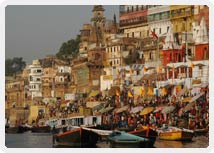 Varanasi or Banaras, as it is otherwise known, is a city situated on the banks of the river Ganga in the Indian state of Uttar Pradesh. It is considered holy by Hindus, Buddhists and Jains alike, and enjoys the distinction of being one of the oldest continually inhabited cities in the world .
Varanasi or Banaras, as it is otherwise known, is a city situated on the banks of the river Ganga in the Indian state of Uttar Pradesh. It is considered holy by Hindus, Buddhists and Jains alike, and enjoys the distinction of being one of the oldest continually inhabited cities in the world .
The city has served as a seat of culture and religion in northern India for centuries. Hailed as the cultural capital of India, its contributions are numerous. It has given the world classical Hindustani music and produced many prominent Indian philosophers, poets, writers, and musicians.
Varanasi also made its substantial contribution to traditional medicine in Ayurveda. Close to hundred ghats are part of the Varanasi landscape and it may be aptly described as the city of ghats. Varanasi is also known as the religious capital of India by virtue of the several temples it is home to religious mythology accounts for the founding of the city in the Hindu deity, Shiva, thus making it one of the most important pilgrimage destinations in the country.
It is one of the seven sacred cities of Hindu religious map. The city finds mention in the Rigveda, Ramayana, and Mahabharata, Varanasi also has a rich educational history .It is home to the Banaras Hindu University and has made its contributions to learning and education.
How to get there
Varanasi is well-connected to the rest of India by plane, with the nearest airport around 30 kms from the city centre .Several domestic flights operate to Delhi, Mumbai, etc. Train is the best way to get to Varanasi, from Delhi, Lucknow, Kolkatta,etc.Buses run by the State Government connect Varanasi to other points in North India-they are available once in an hour in the mornings and in the evenings as well.
Accommodation
Accommodation options in Varanasi are several, in terms of luxury hotels and budget hotels .Ramda Plaza hotel, Hotel Varanasi, Hotel Meraden Grand and the Taj Ganges are some of the high-segment options available while budget hotels offer cheaper rates. Sita Guest House, Maruti Guest House, Shanti Guest House are among the tourist options.
Shopping
Varanasi was in ancient times a commercial and industrial center famous for its muslin and silk , perfume , ivory and sculpture. Silk items are on display almost all over the marketplace, so make sure you pick up a Varanasi silk saree or two. Extensive embroidery work and rich borders have made the sarees world-famous. Stone items, handicrafts and curious are worth the shopping trip.
Food
Varanasi is home to several restaurants, both speciality and multi-cuisine. North Indian thalis are an option. While at Varanasi, make sure you include Middle-Eastern food in your diet by visitng the Haifa Café on Assi ghat and the Hayats.
When to go
Varanasi summers can be a torture for tourists, especially if you are traveling from regions where the climate is mild and pleasant. Temperatures touch levels as high as 45 in the summers so the winters are a better bet .October-April is a good time for touristing Varanasi as the weather is pleasant and welcoming.
Fairs and festivals
Popular among tourists is the Dhrupad Mela of Varanasi, a music festival performed by reknown artists on the Tulsi Ghat. The Ramlila festival showcases ancient rituals of Rama’s time and several themes from the Ramayan and is another hit with international tourists. Diwali that celebrates the return of Ram to Ayodhya is a great time to be around Varanasi, with the festival falling in the month of October-November.Important tourist information
It is important for tourists to be aware and alert at all times .Tourists may be asked to leave their electronic belongings at temple entry points so beware of theft .Often, cell phones that tourists deposit are used for making calls. Women must take care to dress modestly, traditional wear such as the salwar kameez is recommended .
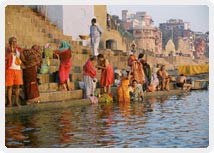 A ghat is a step-way leading down to a river and Varanasi is known for its numerous Ghats that constitute its tourist prospects. Among the several ghats of Varanasi, Dashashwamedha is the most spectacular Ghat.While some believe that Lord Brahma created it to welcome his celestial counterpart Shiva., others uphold that he sacrificed ten horses in a sacrifice here and the name Dashashwamedha came to be. A daily fire ritual is performed here. The Manikarnik Ghat is attributed to a Shiva-Parvati tale where the Goddess is said to have hid her earrings and asked Shiva to find them. The ghat also serves as a crematorium. The Shinde Ghat lies adjacent to the Manikarnik and is home to a Shiva temple. Maharaja Jai Singh II of Jaipur built Mana-Mandir Ghat and also his observatory is also located here, with similar observatories in Delhi, Jaipur and Ujjain. Man Singh of Amber built Mana-Sarowar Ghat. Maharaja of Darbhanga built the Darbhanga Ghat. The Lalita Ghat is the site of Ganga Keshav Temple, a wooden temple built in Nepali architectural style, dedicated to Lord Vishnu. Assi Ghat which is at the end of the continuous line of ghats, is a favorite site of painters and photographers.
A ghat is a step-way leading down to a river and Varanasi is known for its numerous Ghats that constitute its tourist prospects. Among the several ghats of Varanasi, Dashashwamedha is the most spectacular Ghat.While some believe that Lord Brahma created it to welcome his celestial counterpart Shiva., others uphold that he sacrificed ten horses in a sacrifice here and the name Dashashwamedha came to be. A daily fire ritual is performed here. The Manikarnik Ghat is attributed to a Shiva-Parvati tale where the Goddess is said to have hid her earrings and asked Shiva to find them. The ghat also serves as a crematorium. The Shinde Ghat lies adjacent to the Manikarnik and is home to a Shiva temple. Maharaja Jai Singh II of Jaipur built Mana-Mandir Ghat and also his observatory is also located here, with similar observatories in Delhi, Jaipur and Ujjain. Man Singh of Amber built Mana-Sarowar Ghat. Maharaja of Darbhanga built the Darbhanga Ghat. The Lalita Ghat is the site of Ganga Keshav Temple, a wooden temple built in Nepali architectural style, dedicated to Lord Vishnu. Assi Ghat which is at the end of the continuous line of ghats, is a favorite site of painters and photographers.
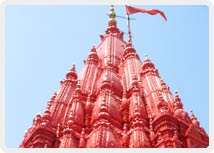 The Durga Temple is an eighteenth century construction attributed to a Bengali queen. The temple is also referred to as the Monkey temple because of the presence of hordes of monkeys in the temple. Local legends would tell you that the Durga image was not man-made but appeared on its own. This temple is a popular destination particularly during Navratri. The temple architecture is North Indian, reflecting the Nagara Style. Multi-tiered spires and red stone characterise the temple, signifying the red colour of Durga. The tample tank, the Durga Kund, was earlier connected to the river itself thus refreshing the temple .The annual snake festival, NagPanchami, is marked by extensive ornamentation of the tank with imagery of Vishnu on a snake.
The Durga Temple is an eighteenth century construction attributed to a Bengali queen. The temple is also referred to as the Monkey temple because of the presence of hordes of monkeys in the temple. Local legends would tell you that the Durga image was not man-made but appeared on its own. This temple is a popular destination particularly during Navratri. The temple architecture is North Indian, reflecting the Nagara Style. Multi-tiered spires and red stone characterise the temple, signifying the red colour of Durga. The tample tank, the Durga Kund, was earlier connected to the river itself thus refreshing the temple .The annual snake festival, NagPanchami, is marked by extensive ornamentation of the tank with imagery of Vishnu on a snake.
Contrary to popular tourist perception, this temple is a tribute to Mother India.the human form of India. The Bharat Mata temple at Varanasi was inaugurated by Mahatma Gandhi in 1936 and is home to some of the most perfectly drawn relief maps of India in marble The Temple was a gift from the nationalists Shiv Prasad , a Bharat Ratna awardee.
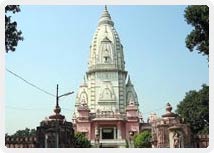 The Golden Temple of Varanasi , was built in 1780 by Maharani Ahilyabai Holkar of Indore, . This temple enshrines the jyotirlinga version of Lord Shiva and is an important tourist site.In the 1800s, Maharaja Ranjit Singh, the ruler of Punjab donated gold to cover the two domes of the temple. The temple was razed by the Muslim Emperor Aurangzeb who built a mosque over it It was later reconstructed close to the mosque, and is many times a cause of local strain among Hindus and Muslims. This temple is open only to Hindus.
The Golden Temple of Varanasi , was built in 1780 by Maharani Ahilyabai Holkar of Indore, . This temple enshrines the jyotirlinga version of Lord Shiva and is an important tourist site.In the 1800s, Maharaja Ranjit Singh, the ruler of Punjab donated gold to cover the two domes of the temple. The temple was razed by the Muslim Emperor Aurangzeb who built a mosque over it It was later reconstructed close to the mosque, and is many times a cause of local strain among Hindus and Muslims. This temple is open only to Hindus.
Yet another temple on the Varanasi itinerary is the Tulsidas temple. This temple was constructed as a tribute to Lord Rama. It is situated at the place Where Tulisdas, an outstanding medieval poet wrote the epic Ramcharitmanas which narrates the life of Lord Ram. The walls of the temple bear verses from the Ramayana. It is a stones throw from the Durga Temple.
This temple is located on the premises of the Banaras Hindu University, a modern place of worship conceptualized by Pandit Madan Mohan Malviya. This Birla construction enjoys a secular flavour and is open to all, irrespective of caste and creed.
Manmandir is known essentially for its magnificent observatory built in the eighteenth century , with ornate window casings. It was built by the Maharaja of Jaipur. Sawai Jai Singh II. The northern part of the ghat is set with a pretty stone balcony. The pilgrims pay homage to the important lingam of Someshwar, the Lord of the Moon.
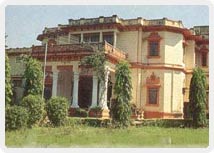 Bharat Kala Bhavan is a repository of art, architectural data and a vast collection of paintings that are of historical value. Severral images in this museum bear testimony to the existence of the Krishna cult in Kashi in the fifteenth and sixteenth centuries .It was established in 920 in the BHU campus. Bharat Kala Bhavan also keeps a great collection of miniature paintings from the Mughal era and other dynasties. Some of the important sections in the Bharat Kala Bhavan are Mahamana Malaviya gallery, Nicholas Roerich gallery and several other galleries that capture the evolution of art, architecture and sculpture in Banaras through the ages.
Bharat Kala Bhavan is a repository of art, architectural data and a vast collection of paintings that are of historical value. Severral images in this museum bear testimony to the existence of the Krishna cult in Kashi in the fifteenth and sixteenth centuries .It was established in 920 in the BHU campus. Bharat Kala Bhavan also keeps a great collection of miniature paintings from the Mughal era and other dynasties. Some of the important sections in the Bharat Kala Bhavan are Mahamana Malaviya gallery, Nicholas Roerich gallery and several other galleries that capture the evolution of art, architecture and sculpture in Banaras through the ages.
BHU or Banaras Hindu Iniversity was founded by Pandit Madan Mohan Malaviya, with the assistance of Annie Beasant. Its expansive campus was built on land donated by the Maharaja of Kashi. It stands as a prominent educational institution on the India map, with the university offering several courses and specializing in Sanskrit.
Early Morning Boat Ride at Ganges
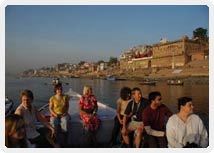 The early morning boat ride on the Ganges begins with a greeting by the sun in all its glory .Lighted candles floating on delicate banana leaves on the river and devotees taking the holy dip in the Ganga are a common sight. The boat ride takes you past the various ghats of Varanasi, offering a glimpse of the city at its religious best, with the men getting ready for their daily prayer, the sages lost in prayer and ritual. It begins from the Dashashwamedh Ghat and takes you through several others, such as the Manikarnik Ghat that is the cremation zone of Varanasi, where the dead are burnt. The Munshi Ghat is home to the city’s Muslim population.In short, the boat ride is the best part of the Varanasi trip and best represents India at its traditional best, with the ride offering a glimpse of tradition and spirituality coming together against the backdrop of the golden sun.
The early morning boat ride on the Ganges begins with a greeting by the sun in all its glory .Lighted candles floating on delicate banana leaves on the river and devotees taking the holy dip in the Ganga are a common sight. The boat ride takes you past the various ghats of Varanasi, offering a glimpse of the city at its religious best, with the men getting ready for their daily prayer, the sages lost in prayer and ritual. It begins from the Dashashwamedh Ghat and takes you through several others, such as the Manikarnik Ghat that is the cremation zone of Varanasi, where the dead are burnt. The Munshi Ghat is home to the city’s Muslim population.In short, the boat ride is the best part of the Varanasi trip and best represents India at its traditional best, with the ride offering a glimpse of tradition and spirituality coming together against the backdrop of the golden sun.
Tajmahal Tours
Golden Triangle India
- Golden Triangle with Corbett
- Golden Triangle with Goa
- Golden Triangle with Kathmandu
- Golden Triangle with Wildlife
- Indian Heritage Tour with Tajmahal
- Buddhist Pilgrimage with Golden Griangle Tour
- Golden Triangle Tour
- Golden Triangle Tour with Haridwar and Rishikesh
- Golden Triangle with Khajuraho Varanasi
- Golden Triangle with Kashmir
- Tajmahal with Pushkar Fair
Delhi Tourism
Jaipur Tourism
Agra Tourism
Golden Triangle Extension
- Ranthambhor National Park
- Khajuraho Tourism
- Varanasi Tourism
- Rishikesh Tourism
- Haridwar Tourism
- Corbett Wildlife Sanctuary
- Mathura Travel
- Vrindavan Travel
- Gwalior Travel
Activities to Do
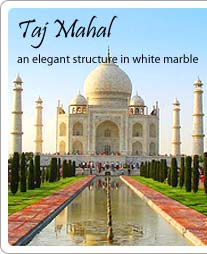

Copyright © 2020, www.tajmahal-india-tours.com
Recognized by Ministry of Tourism, Government of India
National Tourism Award Winner
Powered by SOFTTIX

